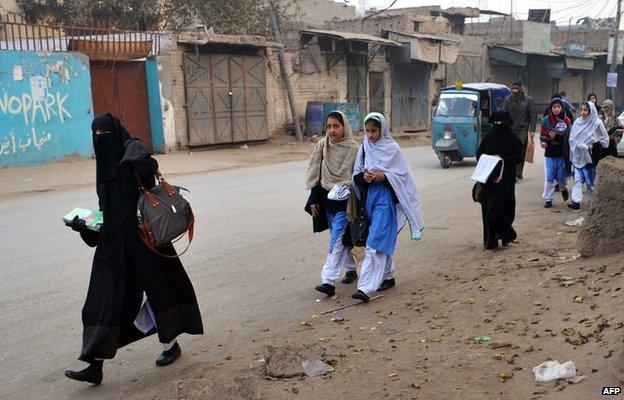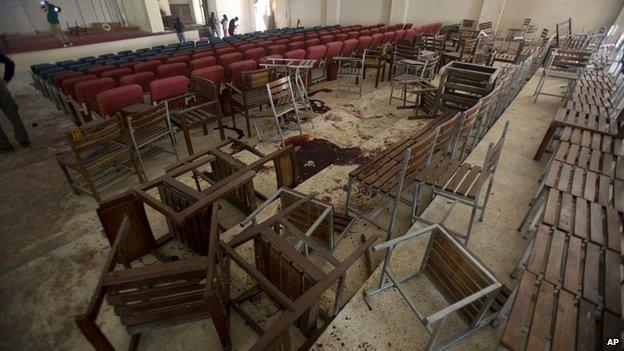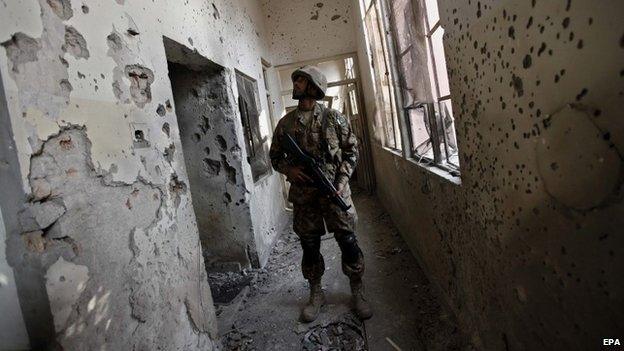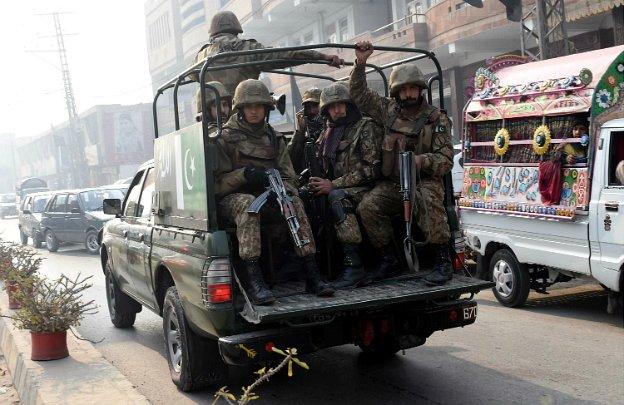Peshawar attack: Schools reopen after Taliban massacre
- Published
Returning students were greeted by Pakistan Army Chief General Raheel Sharif
Pupils and teachers have returned for the first time to the school in the Pakistani city of Peshawar where more than 150 people were killed last month.
A ceremony was held to remember the victims of the Taliban attack on 16 December.
Schools across Pakistan are re-opening after an extended break prompted by the massacre.
US Secretary of State John Kerry arrived in the country on Monday to discuss the campaign against extremism.
He is meeting Pakistan's Prime Minister Nawaz Sharif to make the case for a more robust effort against all militant groups.
The Pakistani government has made changes after the attack last month - it has scrapped a moratorium on executions and has moved to establish military courts to try terrorism cases.
But US officials travelling with Mr Kerry have said they want to ensure there is a "real and sustained effort" against militants threatening not just Pakistan but also Afghanistan and India.
Peshawar teacher Andaleeb Aftab: "I want to go back, I want to teach the students"
Pakistan's National Security Adviser Sartaj Aziz welcomed Mr Kerry's visit on Monday and suggested that he would be visiting the school that was attacked in Peshawar. The state department has not confirmed Mr Kerry's itinerary.
Seven Taliban attackers wearing bomb vests cut through a wire fence to gain entry to the Army Public School in Peshawar on 16 December.
They went from class to class, killing 152 people - 133 of them children - and injuring more than 120. All seven gunmen were killed.
"When they entered the halls, their fingers were on the triggers," said Munawar Hussain, a teacher who survived the attack.
Mr Hussain told the BBC that the attackers had aimed at their heads. He only narrowly escaped being shot by hiding under a table.
"Today I was very emotional," he said on his first day back at school.
Many of his pupils will never return. "They are missing, I felt their absence," he added.
The Taliban said the attack - the group's deadliest in Pakistan - was in response to a government offensive in North Waziristan and the nearby Khyber area that began in June 2014.
Student Aqif Azeem: "I'm proud to be back and so happy"
The school killings were condemned across the world, with US President Barack Obama saying terrorists had "once again shown their depravity". The Afghan Taliban also criticised the attack.

Parents have demanded assurances from the government that their children's schools will be protected

The auditorium, where most of the children were killed, remains closed

The Taliban attackers went from class to class in the school, killing 133 children and injuring dozens

Analysis: BBC's Shahzeb Jillani in Peshawar
It's been a difficult day for many of the children and teachers who survived the Taliban attack.
Some had mixed feelings about going back to the school where they witnessed the massacre. Yet, most of them put on a brave face as they arrived at the school.
At the morning assembly, the mood was sombre. A ceremony was held to remember those who lost their lives, and students and parents were greeted by Pakistan's powerful army chief, Raheel Shareef.
He tried to reassure them that the government would do everything to protect their school.
After today's symbolic reopening of the school, classes are expected to resume from Tuesday.
Parts of the school have been repaired and repainted. But the main auditorium hall where most of the children were massacred remains closed.
But across the country, parents remain apprehensive about sending their children back to school.
In a country where fear stalks virtually every aspect of public life, something as simple as going to school has now become an act of courage and bravery.


The attack on the school, which was an army school, was "revenge" for military offensives against the Taliban
Meanwhile, Pakistan's spy chief Razwan Akhtar met Afghan President Ashraf Ghani on Sunday, during the intelligence chief's third trip to the country in recent months.
The meetings indicate more co-operation between the two countries which have frequently criticised each other on responses to tackling the flow of militants across their porous shared border.
Security has been stepped up at schools across the country since the attack.
The government has ordered institutions to do more to protect schoolchildren and audits have been carried out on hundreds of schools since 16 December, according to Pakistani media.
The school is near a military complex in Peshawar and many of the pupils that attend are the children of military personnel.
The city, close to the Afghan border, has seen some of the worst of the violence during the Taliban insurgency in recent years.